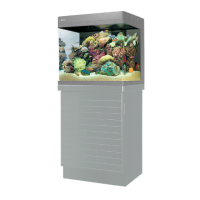47
User Manual
To determine proper dosage for these treatments, monitor the
calcium and alkalinity using test kits.
Magnesium
Magnesium's primary importance lies in its effect on the
alkalinity/calcium balance in reef aquaria. Some corals and
coralline algae deplete magnesium by absorbing it into their
growing skeletons.
Seawater and reef aquarium water ideally have calcium carbonate
at super-saturation levels. This naturally causes calcium to
precipitate out of solution, forming crystals. Magnesium binds
to these crystals, effectively blocking their surface and preventing
further growth that would otherwise pull more calcium out of
the solution. This helps keep calcium and alkalinity at natural
levels.
You should maintain magnesium levels of 1200-1400ppm. We
recommend using Red Sea Success Magnesium supplement to
bring the concentration up to par.
Phosphate
Inorganic orthophosphate occurs in aquaria in several chemical
forms (H
3
PO
4
, H
2
PO
4
-2
, HPO
4
-
and PO
4
-3
). Most test kits measure
this form of phosphate; it will typically accumulate in reef aquaria.
These phosphates enter the aquarium with food, added water
and some methods of calcium and alkalinity supplementation.
If allowed to accumulate above natural levels, phosphates can
present two problems:
Calcification inhibition
Algae growth
For these reasons, keep the phosphate below 0.03ppm. To
accomplish this, incorporate periodic water changes, good
skimming, balanced feeding and proper maintenance.
Ammonia
As mentioned earlier, ammonia results from the decomposition
of organic matter, and from the excretory processes of fish. It is
highly toxic to marine life. In an established aquarium, the
nitrifying bacteria rapidly convert ammonia to nitrite, nitrate and
nitrogen gas, compounds with much less toxicity to fish than
ammonia itself. Ammonia levels should not rise above 0.1ppm.
To maintain low-to-zero levels of ammonia, combine periodic
water changes, good skimming, balanced feeding and good
maintenance.
Nitrite
Seawater makes nitrite far less toxic than fresh water does. As
an intermediate product of ammonia oxidation, nitrite demands
little or no attention from the reef aquarist. Nevertheless, tracking
nitrite can prove instructive by demonstrating the biochemical
processes at work in the aquarium. Nitrite levels should not
exceed 0.1ppm.

